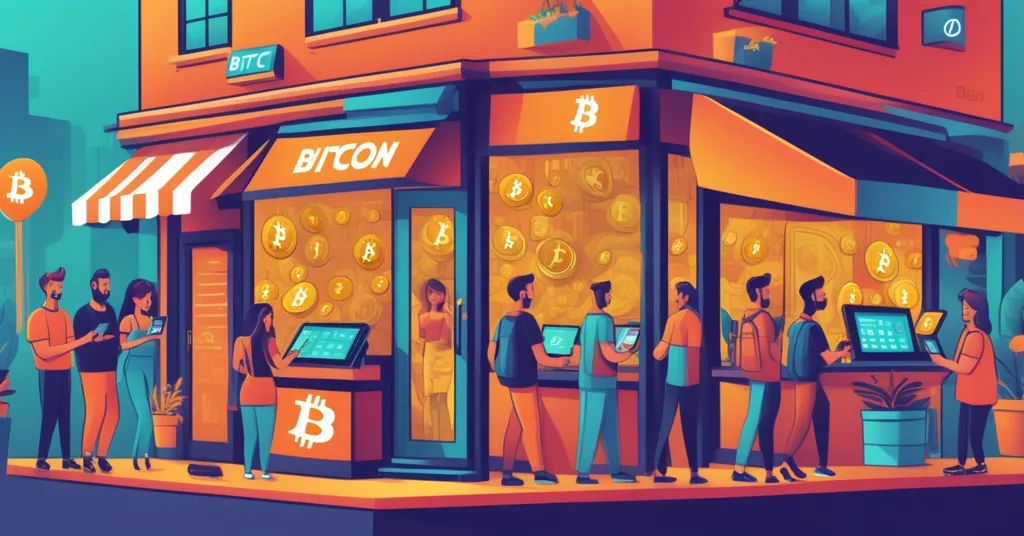Block’s Square Bitcoin Launch: A Game-Changer for Merchant BTC Payments

Block’s Square Bitcoin Launch: Revolutionizing BTC Payments for Merchants
Block Inc., the payments powerhouse founded by Bitcoin evangelist Jack Dorsey, has dropped a bombshell with Square Bitcoin—a feature baked into its Square POS system that lets U.S. merchants (except those in New York) accept Bitcoin payments starting November 10. This isn’t just a shiny new toy; it’s a calculated push to make Bitcoin a checkout staple for small businesses, with fee waivers and wallet management tools in tow. But is this the adoption catalyst we’ve been waiting for, or a risky gamble on a volatile asset?
- Launch Details: Square Bitcoin rolls out November 10 for U.S. merchants (excluding New York), enabling Bitcoin payments.
- Fee Incentive: No processing fees until 2026, then a 1% fee from January 1, 2027.
- Adoption Scale: With Square’s 4 million+ merchants, this could redefine Bitcoin’s everyday use.
What Square Bitcoin Delivers to Small Businesses
Let’s break down the nuts and bolts of Square Bitcoin for those new to the game. Integrated directly into Square’s point-of-sale (POS) system—a digital tool for processing transactions at checkout—this feature allows merchants to accept Bitcoin as payment, just like swiping a credit card. But it’s not limited to transactions; businesses can convert up to 50% of their daily sales into BTC, offering an easy entry point to crypto investment without the hassle of setting up separate exchange accounts. Through Square’s dashboard, merchants can store, trade, or withdraw their Bitcoin holdings, turning a simple POS terminal into a full-fledged crypto wallet. For small businesses often locked out of sophisticated financial tools, this is a potential game-changer. For more on this groundbreaking feature, check out the details on Block’s introduction of Square Bitcoin for merchants.
To sweeten the pot, Block is waiving all processing fees until 2026. Come January 1, 2027, a 1% transaction fee will kick in, still cheaper than many traditional payment processors like Visa or Mastercard, which often charge 2-3%. Miles Suter, Block’s Head of Bitcoin Product, summed up the mission with a statement that cuts to the core:
“We’re making Bitcoin payments as seamless as card payments while giving small businesses access to financial management tools that, until now, have been exclusive to the largest corporations.”
Suter’s words aren’t just PR fluff. Small businesses—think local coffee shops or corner stores—rarely get access to the kind of financial tech that big players wield. Square Bitcoin could level that field, especially with Block’s massive reach of over 4 million merchants. If even a chunk of them jump on board, we’re talking about a serious boost for Bitcoin adoption in day-to-day commerce.
Massive Reach, Massive Potential for Bitcoin Adoption
Square’s merchant base isn’t just a number—it’s a potential tidal wave for crypto payment solutions. With over 4 million businesses already using Square’s POS system, Bitcoin could shift from a speculative asset to something as mundane as a debit card in the eyes of consumers. Market research backs this up: eMarketer projects an 82% surge in U.S. crypto payment usage between 2024 and 2026. A YouGov poll also shows rising consumer interest in crypto payments across the U.S. and U.K., hinting that the public might be ready to pay for their latte in BTC. Even Wall Street took notice, with Block’s stock (NYSE: SQ) ticking up 2.6% on the announcement day, per Yahoo Finance, signaling investor confidence in this Bitcoin strategy.
Block isn’t new to this rodeo either. Under Jack Dorsey’s leadership—a man who’s practically Bitcoin’s unofficial cheerleader—the company holds 8,692 BTC, placing it 13th among public Bitcoin holders. From Cash App’s Bitcoin trading feature launched back in 2018 to this merchant-focused push, Block’s commitment to decentralized finance tools is clear. Dorsey’s vision isn’t subtle: he wants Bitcoin to be the future of money, not just a niche asset for tech bros and hodlers.
Roadblocks to Adoption: Not All Sunshine and Rainbows
Let’s pump the brakes on the hype train. While the potential for Square Bitcoin to drive mainstream adoption is real, there are some glaring hurdles. First off, the rollout excludes New York, likely due to the state’s notorious BitLicense—a regulatory nightmare introduced in 2015 that imposes hefty fees and compliance burdens on crypto businesses. It’s scared off plenty of firms, and Block’s sidestep here shows that even big players aren’t immune to bureaucratic red tape. International merchants are also left out for now, underscoring the logistical and legal mess of scaling crypto payments globally.
Then there’s Bitcoin itself. Sure, converting daily sales to BTC sounds edgy and futuristic, but what happens when the price nosedives overnight? Imagine a small business banking on those earnings to restock inventory, only to watch 20% of their value vanish in a flash. Bitcoin’s volatility is a merchant’s nightmare, and while Block’s user-friendly dashboard might ease the learning curve, it doesn’t solve the rollercoaster problem. On top of that, Bitcoin transactions on-chain can take 10 minutes or more to confirm during busy periods—a lifetime when a customer’s waiting at the counter. Block hasn’t clarified if they’re leveraging faster off-chain solutions like the Lightning Network, which could mitigate this. Without that, good luck convincing a bodega owner to deal with the delay.
Fee Waiver: Genius Move or Slick Gimmick?
Waiving fees until 2026 is a hell of a carrot to dangle in front of merchants hesitant about crypto. It’s a clear play to drive early adoption of Bitcoin payments, letting businesses test the waters without upfront costs. But come 2027, when that 1% fee hits, will merchants stick around, or tell Block to take a hike? Sustainability is a question mark here. Running a payment system isn’t cheap, and Block’s got to cover costs somehow. If the fee structure scares off users later, this bold move could backfire. Plus, what’s stopping competitors from undercutting that 1% with even sweeter deals down the line?
Merchant Perspectives: Will They Bite?
Put yourself in a small business owner’s shoes. On one hand, accepting Bitcoin at checkout could attract a tech-savvy crowd, maybe even boost sales with crypto enthusiasts. Square’s dashboard makes it less intimidating, no need to wrestle with clunky exchanges or cold wallets. On the other hand, the volatility, the learning curve, and the risk of scams—could scammers target naive merchants with fake BTC payment schemes?—are real turn-offs. Block better have ironclad fraud detection, or horror stories of ripped-off shopkeepers could tarnish this initiative fast. For risk-averse merchants, stablecoins like USDC, with their pegged value, might be a safer bet than Bitcoin’s wild swings. While BTC is king in cultural clout, Block might need to counter the appeal of less volatile alternatives to keep merchants hooked.
Competitive Landscape: Square Bitcoin vs. the Field
Block isn’t the only player pushing crypto payment solutions. BitPay and OpenNode have been in the merchant crypto game for years, offering Bitcoin and altcoin payment processing with varying fee structures—BitPay, for instance, charges 1% from the get-go. Square Bitcoin’s fee waiver gives it an edge for now, and its seamless integration into an existing POS system used by millions is a unique selling point. But competitors could adapt, and larger rivals like PayPal are expanding their crypto offerings too, allowing transfers of Bitcoin, Ether, and their stablecoin PYUSD between accounts. If PayPal or others prioritize merchant education and stability over Block’s Bitcoin-first approach, Square Bitcoin’s shine could dull. Meanwhile, Google’s Agent Payments Protocol teases AI-driven transaction innovations that might redefine the space entirely. Block’s got a head start, but it’s not a solo race.
Jack Dorsey’s Bitcoin Obsession: Vision or Zealotry?
Dorsey’s fingerprints are all over this. His relentless push for Bitcoin as a mainstream currency drives Block’s every crypto move, from Cash App to Square Bitcoin. It’s hard not to admire the conviction—decentralization, financial freedom, sticking it to the traditional banking system. All the good stuff we champion. But let’s play devil’s advocate: is Bitcoin really ready to rival the dollar at checkout? Network congestion during peak times can jack up on-chain fees, making a $5 coffee purchase cost an extra $10 in gas if timing’s bad. And pushing BTC on merchants who might not even grasp what a blockchain is could be more missionary zeal than practical business sense. Block’s betting on simplicity to bridge that gap, but if the average diner owner isn’t ready to HODL through a bear market, this dream might stall.
Broader Trends Fueling Crypto Payments
Despite the risks, the timing for Square Bitcoin feels right. The U.S. is slowly warming to crypto, with regulatory clarity creeping forward and digital assets gaining traction as legit payment methods. Beyond Block, industry moves are aligning—PayPal’s crypto expansion shows merchants have options, while consumer interest spikes per recent polls. Innovations like AI-driven financial tools could smooth crypto’s rough edges, making transactions faster and smarter. Stablecoins, though less sexy than Bitcoin, are carving a niche for payments without the price swings, potentially complementing Block’s BTC focus. Square Bitcoin isn’t a lone wolf; it’s riding a wave of momentum toward normalizing crypto in everyday finance.
Regulatory Headaches: The New York Snub and Beyond
Back to that New York exclusion—it’s not just a footnote. The BitLicense regime requires crypto firms to shell out big bucks and jump through endless hoops for compliance, often making it not worth the hassle. Block’s decision to skip the state for now isn’t cowardice; it’s pragmatic. But it highlights a broader issue: patchwork regulations across the U.S. and globally are a minefield for crypto adoption. Will New York ease up, or will Block find a workaround? And what about international markets? Until those barriers crumble, Square Bitcoin’s global impact remains capped, no matter how slick the tech is.
The Big Picture: Spark or Fizzle for Decentralized Finance?
Square Bitcoin is a ballsy experiment with sky-high stakes. For Bitcoin maximalists like many of us, it’s a triumph—another step toward a world where centralized banks don’t call all the shots. With 4 million merchants in play, this could be the spark that makes BTC everyday money. But the real world loves to throw curveballs: volatility, regulatory walls, and merchant skepticism could douse the flame. Block’s banking on user-friendliness and fee incentives to win the day, but only time will tell if this is the tipping point for decentralized finance or just another overhyped chapter in crypto’s wild saga.
Key Takeaways and Questions on Square Bitcoin
- What is Square Bitcoin and how does it work for merchants?
Square Bitcoin is a feature in Square’s POS system, letting U.S. merchants (excluding New York) accept Bitcoin payments, convert up to 50% of daily sales into BTC, and manage holdings via a dashboard for storage, trading, or withdrawal. - Why is Block waiving fees until 2026, and what’s the catch?
The waiver is a bold incentive to spur early adoption of Bitcoin payments; starting January 1, 2027, a 1% fee applies, which could test merchant loyalty if competitors offer better deals. - Can Square Bitcoin drive mainstream Bitcoin adoption?
With Square’s 4 million+ merchant base, it has massive potential to make Bitcoin a common payment option, though volatility and regulatory limits could slow the rollout. - What market trends support this crypto payment push?
An 82% projected rise in U.S. crypto payment use by 2026, growing consumer interest, and tech innovations like AI-driven tools and stablecoins are creating fertile ground for initiatives like Square Bitcoin. - What are the biggest limitations of this launch?
It’s currently U.S.-only (excluding New York) with no international reach, reflecting regulatory and operational challenges that could hinder global scaling of Bitcoin payments. - Is Bitcoin practical for small businesses right now?
Not fully—volatility, transaction delays, and education gaps pose risks, though Block’s design aims to ease these pain points; stablecoins might appeal more to cautious merchants.



